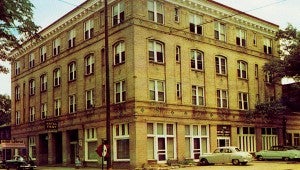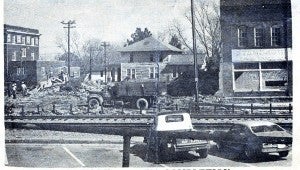PRICELESS MEMORIES: Postcard holds memories of Troy landmark
Published 2:00 am Saturday, September 5, 2015

Picture is a postcard with a picture of the Hotel Troy. Cindy Hinton’s father owned and operated the hotel from 1957 until it closed in 1971.
Cindy Hinton has a safe, keeping-place for an aging picture postcard.
For her, the postcard is priceless. The fading photograph holds a thousand treasured memories
Hinton’s dad, Ralph Waldo Emerson — not the American poet, but perhaps of same lineage–owned and operated Hotel Troy from 1957 until it closed in 1971.
The photograph on the postcard is of Hotel Troy in its heyday.
“Back then, most all hotels advertised with postcard photographs,” Hinton said. “The postcards were put in all the rooms with hopes that the guests would use them and mail them. That was good and inexpensive advertising for the hotels.”
In the mid-1950s, Ralph Waldo Emerson was running the John Wesley Hotel in Savannah, Ga. and was given a couple of opportunities to own a hotel.
“Daddy had two opportunities,” Hinton said. “One, was to purchase Hotel Troy or to buy a hotel that was just being constructed in Hilton Head, South Carolina. He chose to buy Hotel Troy because it was an existing hotel and business was booming. Hilton Head was just beginning to build. If only he had known.”
Ralph Waldo Emerson took ownership of Hotel Troy, a four-story “fine” hotel with 52 rooms in 1957. He found himself in good company in Downtown Troy. Walt Whitman, not the American poet, owned and operated Whitman’s Drug Store, and Benjamin Harrison, not the president, owned and operated Harrison Funeral Home.
“I lived and played among distinguished men, past and present,” Hinton said, with a smile.
The Emerson family lived in Hotel Troy and the hotel boomed for many years. There were few nights when the hotel was not filled and fewer nights when the hotel’s Pine Lounge was not hopping.
“The rooms were very nice for those days,” Hinton said. “Most of the rooms had a bathroom and a bathroom was conveniently located on each floor for the rooms that didn’t have a bathroom. But there was a sink in all the rooms without a bath.”
A few, and only a few, rooms had window air conditioners and those rooms were at a premium.

An old news photo shows the damage and the work being done after the Hotel Troy burned down in 1971.
A single room, a room with a single bed, went for $9 a night and the double rooms, with two single beds or one double bed, were a couple dollars more.
“We had a dining room that offered three meals a day,” Hinton said. “Our ‘Blue Plate Special’ was 49 cents and you got a meat, two vegetables, bread, dessert and tea. Most of the hotel guests were travelers but we did have several elderly women who were permanent guests. They rented by the week.”
There were no ADA requirements back then but it didn’t matter. Hotel Troy had elevator service to all three upper floors.
“The Otis Elevator was hand driven,” Hinton said. “My daddy hired Oscar Butts to operate the elevator. He sat outside the elevator on a stool until someone wanted to ride.”
Hinton said buzzers were located next to the elevator doors so the guests could alert the elevator operator when they were ready to ride.
“When you got in the elevator, it was like you were in a wire cage,” she said. “There was a heavy metal door that was closed before the cage went up or down in the shaft. The operator had to stop the elevator right level with the floor. If he didn’t, you had to step up or down to get off the elevator. That could be tricky. It took skill to operate an elevator.”
Hotel Troy also had a switchboard and the operator would “plug in” the calls.
“Our number was 8-4-0, I don’t know why I remember that except telephones were a big deal back then,” Hinton said. “Another thing I remember so well was that each room had a key with a piece of oval plastic attached that had the room number on it. Keys. We had room keys at Hotel Troy.”
The switchboard was located in the lobby of the hotel behind the check-in desk. On the back wall were cubbyholes where the guests’ mail and room keys were kept.
“When you went out for a while, you could leave your room key at the desk. The clerk would put the key in the room’s cubbyhole and you could pick it up when you returned,” Hinton said. “The lobby was the gathering place for all the hotel guests. The only TV was in the lobby and the guests would come there to watch TV, read the newspaper or just sit and visit.”
The Pine Lounge was contained within the hotel and was a popular gathering place for townspeople and Troy State College students.
“We had a jukebox in the lounge and people enjoyed coming in and listening to the music and dancing,” Hinton said. “L.L. Dozier had a business that serviced jukeboxes. He would come once month to change out the 45-RPMs. Daddy started serving pizza and chicken baskets in the lounge.”
The legal drinking age was 21 and Hinton said ABC men visited the lounge once or twice a week to make sure no minors were being served.
Hotel Troy enjoyed its boom days into the mid-1960s.
“Along with the Highway 231-bypass came the Holiday Inns and nobody was coming downtown anymore,” Hinton said. “So, Daddy closed the hotel to the public. But, the college rented the hotel for several years while dorms were being built. The hotel would house the girls one quarter and boys another quarter depending on the progress of the construction projects. Meals weren’t served but there was a snack bar for the students.”
Hotel Troy closed its doors in 1971 and the Ralph Waldo Emersons moved out to the country.
On December 23, 1971 on a cold, rainy night, Hotel Troy was gutted by fire.
“Several windows in the hotel had been broken out,” Hinton said. “The wind was high and a spark from an electric wire went through a broken window and caught a rotten window curtain on fire. The fire burned up and down and everything was lost.”
The grand ole hotel that has served the City of Troy so well for so long was only a memory for Troy residents and the thousands of guests who “overnighted” there. Hotel Troy isn’t just a fleeting memory for Cindy Hinton. It’s a treasured memory that a postcard holds and time cannot erase.



